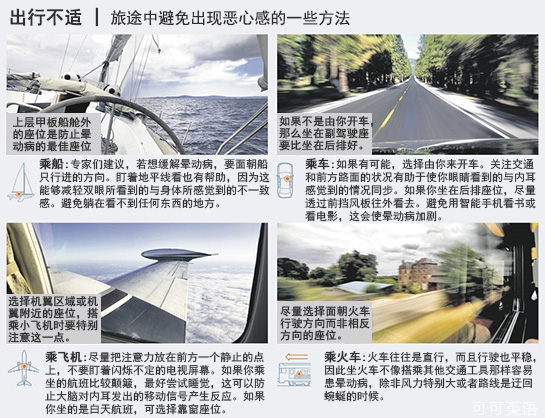(单词翻译:单击)

Researchers from the Navy, the National Aeronautics and Space Administration and academia are studying causes and potential treatments of motion sickness, hoping to formulate better products for situations that range from the extreme (space!) to the mundane (road trip to Grandma's, anyone?).
美国海军、美国国家航空航天局(National Aeronautics and Space Administration,简称“NASA”)以及学术界的研究人员对晕动病的成因及潜在疗法进行了研究,希望能生产出适用于从极端情形(比如太空!)到普通情形(比如坐车去奶奶家,有没有人有此经历?)等各类情形的高效药品。
There's nothing quite like motion sickness to ruin summer travel, with symptoms including dizziness, headache, nausea and most unfortunately, vomiting. Some 25% to 40% of the population suffers from some degree of motion sickness, depending on the mode of transportation.
再没什么事情能像晕动病一样毁掉你的夏日旅行了,它会让你出现头晕、头痛、恶心等症状,情况最糟糕时还会引发呕吐。根据交通方式的不同,大约有25%到40%的人在某种程度上受到晕动病的折磨。
At Siena College, in Loudonville, N.Y., researchers have studied the effectiveness of ginger capsules, facial cooling and listening to music as a distraction for lessening symptoms and physiological responses to motion sickness.
关于服用生姜胶囊、冷敷脸部以及通过听音乐分散注意力来缓解晕动病的症状及其引发的生理反应的效果,纽约州劳顿维尔(Loudonville)锡耶纳学院(Siena College)的研究人员也进行了研究。
NASA and the Navy are collaborating with pharmaceutical company Epiomed Therapeutics, of Irvine, Calif., to develop a nasal spray containing scopolamine, a drug currently used in a prescription-only patch for those prone to seasickness. Researchers say the drug's strong possible side effects, such as drowsiness and dry mouth, would be significantly reduced with a nasal spray.
NASA、美国海军与加州尔湾(Irvine)的制药公司Epiomed Therapeutics展开合作,研制了一种含莨菪硷的鼻喷雾剂。目前莨菪硷被用于一种仅能凭处方购买的治疗易晕船患者的贴片中。研究人员称该药物可能具有使人困倦和口干等强烈的副作用,而使用鼻喷雾剂方式可大幅减轻这些副作用。
Part of the difficulty with devising treatments is that experts don't know exactly what causes motion sickness. The prevailing belief is it is caused by a sensory mismatch between the visual and vestibular systems. The vestibular system, which is part of the inner ear, monitors movement and helps control balance.
制定出晕动症疗法并不容易,部分原因是由于专家们并未确切了解它的成因。人们普遍认为它是由视觉系统与前庭系统感觉上的不一致所引发的。前庭系统属于内耳的一部分,它监测身体的移动并帮助控制身体的平衡。
In other words, our inner ear tells our brain that we are moving, but our eyes tell us we aren't, or vice versa. 'When one of these is telling you you're in motion and the other one is telling you you're sitting, the brain gets confused with the mixed signals, and it causes this sense of sickness,' says Abinash Virk, director of the travel and tropical medicine clinic at Mayo Clinic in Rochester, Minn.
换句话说,当我们的内耳发出信号,告诉大脑我们正在移动时,我们的眼睛却告诉说我们并没有移动,反之亦然。明尼苏达州罗切斯特(Rochester)梅约医院(Mayo Clinic)旅行医学与热带医学门诊部的主任阿比纳什•沃尔克(Abinash Virk)说:“当其中一方告诉你说你正身处运动中,而另一方却告诉你说你正坐着,大脑就会被这些混杂不一的信号搞糊涂,这就会引发恶心感。”
What remain unknown are the reasons why the mismatch causes some individuals to react adversely. One long-standing theory is that the reactions are triggered by the brain's false identification of a toxin in the body, with nausea and vomiting a protective response to get rid of it.
而眼下依然未知的是,为什么感觉不一致会导致某些人产生不良反应。一个由来已久的说法是,这些反应产生的原因是大脑对身体中的一种毒素做出错误辨认,从而以恶心和呕吐作为消除毒素的保护性反应。
Another theory is that body sway, or the change in a person's movements over short time intervals, can explain a propensity to get motion sickness. In Tom Stoffregen's lab at the University of Minnesota, the kinesiology professor measures each subject's body sway over a short period. He has found that individuals who are more susceptible have a more-erratic sway during and even before they are exposed to any stimulation.
另一种解释是,身体的晃动或是身体在短暂时间间隔内的移动变化是人们易于患晕动病的原因。汤姆•施托夫雷根(Tom Stoffregen)是明尼苏达大学(University of Minnesota)的运动机能学教授,他在自己的实验室中测算了每名受试者在一小段时间内的身体晃动情况。他发现,更容易得晕动病的人在受刺激期间的身体晃动较不稳定,甚至在受到刺激之前就会如此。
Dr. Stoffregen uses a force plate, a glorified bathroom scale with pressure sensors, to take measurements of body movement as often as 200 times a second. He studies people both in a lab simulator and on ships.
施托夫雷根使用了一块测力板和一台带压力传感器的体重秤,以每秒多达200次的速率测算身体的动作。他在实验室的模拟装置中以及轮船上进行了他的研究。
In a forthcoming study to be published in the online journal PLOS ONE, Dr. Stoffregen tested the body sway of 35 cruise passengers aboard a ship in the Caribbean before departure. Passengers then reported the intensity of their seasickness. He found a link: Those who reported getting more sea sickness had more body sway at the dock.
他在加勒比海一艘游轮上测试了船上35名游客在出发前的身体晃动情况,这些游客后来报告了他们的晕船程度。他发现其中存在关联:那些报告自己晕船程度较重的人,他们在码头时的身体晃动频率就比较高。该项研究即将发表于《公共科学图书馆•综合》(PLOS ONE)杂志的网络版。


